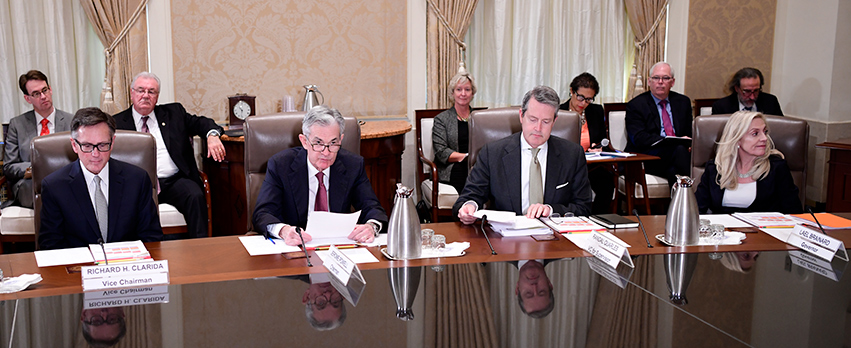After an unending stream of stories throughout the pandemic revealed seemingly rampant congressional insider trading, laughable disclosure practices, and nonexistent enforcement, Congress appears finally to be feeling the pressure to clean up its act. In recent weeks, lawmakers have introduced a flurry of new bills to limit conflicts of interest and help restore public trust in our governing institutions.
As they begin to forge a piece of consensus legislation, they should consider that members of Congress were not the only political leaders to violate public trust throughout the pandemic period. The trading scandals within the Federal Reserve system, for example, revealed material ethical deficiencies that have yet to be satisfactorily addressed. It’s important to recognize that these deficiencies are not unique to the Federal Reserve and that they represent an ongoing threat to public trust in other powerful corners of the government as well. To rebuild that trust, lawmakers must learn the lessons of the Federal Reserve scandals and develop fixes for these deficiencies there and elsewhere.
Disclosure Is Not Enough: One of these lessons simply underscores what we’ve learned from recent ethical scandals in Congress: an ethics regime that depends primarily on disclosure cannot reliably guard against damaging conflicts of interest or safeguard public trust. Even setting aside the poor adherence to disclosure rules that has resulted in a steady drip of revelations about material omissions, seemingly intentionally opaque filings, and late submissions, conflict of interest disclosure is an imperfect safeguard. Simply requiring that leaders alert the public to conflicts of interest is not any guarantee that they will remain impartial or refrain from acting on inside information. Meanwhile, the inevitable delays between when leaders complete transactions and when they disclose them limit the potential for meaningful public scrutiny.
Enforcement Matters: Both sets of ethic scandals have also shone a light on the importance of effective and independent enforcement mechanisms. Business Insider’s sweeping analysis of congress members’ financial disclosures found that 57 lawmakers and almost 200 senior staffers had recently violated the terms of the STOCK Act. Congress itself, through the House and Senate ethics committees, is responsible for ensuring that these individuals face consequences. It should come as no surprise that it has done an exceptionally poor job self-policing. It is not even clear that most of those who violate the act are being made to pay statutorily-mandated fines for these violations, let alone face additional consequences.
At the Federal Reserve, ethical compliance processes also failed to identify apparent violations of ethics law and to hold violators accountable. It is only thanks to outside reporting and subsequent public pressure that some of the officials caught up in these scandals left their posts. The official response to this behavior, once revealed, consisted of referring the cases to the Federal Reserve’s Inspector General for an independent investigation. Except the investigation was not independent at all, because the Federal Reserve’s Inspector General is appointed by the Board of Governors and can be fired by a majority vote of the board. Given the board members’ ultimate power over the I.G., the office’s investigation into their behavior cannot decisively put to rest lingering questions about the integrity of the board and its leadership.
When it comes to Congress’ ethics failures, many members have come to recognize that the expectation that Congress will enforce ethics measures against itself is a key part of the problem. Measures like the Bipartisan Ban on Congressional Stock Ownership Act put enforcement in the hands of independent bodies, in that case the Department of Justice and the U.S. Office of Special Counsel. Unfortunately, even among the few reform proposals that cover the Federal Reserve, none address the enforcement problems there. Lawmakers should fix this in any final reform package.
Don’t Let Obscure but Powerful Positions Slip Through the Cracks. The Federal Reserve’s ethics scandals revealed a troubling oversight in the STOCK Act: the Federal Reserve’s Regional Bank Presidents were not covered. As a result, these leaders were not required to file the periodic transaction reports that would have revealed their suspicious trading activity within weeks of when it took place. Instead, the public only learned about these trades in the fall of 2021, over a year after many of them took place.
Happily, at least one of the proposed ethics reform measures, the STOCK Act 2.0, explicitly covers Federal Reserve Regional Bank Presidents. That is a welcome and obviously necessary change. But legislators should think even bigger; Federal Reserve Regional Bank Presidents are not the only powerful officials who are not required to abide by the STOCK Act. Members of the Public Company Accounting Oversight Board (PCAOB) and the CEO of the Tennessee Valley Authority, for example, do not currently need to file public financial disclosure reports or periodic transaction reports, despite their considerable power over accounting standards and, through them, the financial system. There are certainly others. As they piece together a final reform proposal, lawmakers should not wait for the next ethics scandal to explode, but proactively work to encompass all senior level positions of public trust.

